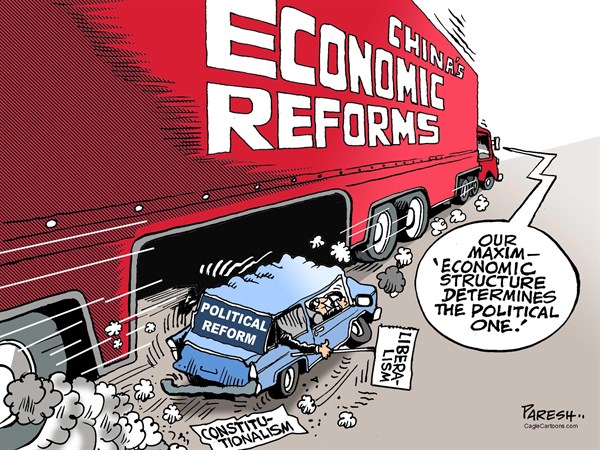A scholar based in China writes: Since the start of its post-Mao reforms in the late 1970s, the communist regime in China has repeatedly defied predictions of its impending demise. The key to its success lies in what one might call “authoritarian adaptation”—the use of policy reforms to substitute for fundamental institutional change. Under Deng Xiaoping, this meant reforming agriculture and unleashing entrepreneurship. Under Jiang Zemin, it meant officially enshrining a market economy, reforming state-owned enterprises, and joining the World Trade Organization. Under Hu Jintao and Wen Jiabao, it meant reforming social security. Many expect yet another round of sweeping reforms under Xi Jinping—but they may be disappointed.
The need for further reforms still exists, due to widespread corruption, rising inequality, slowing growth, and environmental problems. But the era of authoritarian adaptation is reaching its end, because there is not much potential for further evolution within China’s current authoritarian framework. A self-strengthening equilibrium of stagnation is being formed, which will be hard to break without some major economic, social, or international shock.
One reason for the loss of steam is that most easy reforms have already been launched. Revamping agriculture, encouraging entrepreneurship, promoting trade, tweaking social security—all these have created new benefits and beneficiaries while imposing few costs on established interests. What is left are the harder changes, such as removing state monopolies in critical sectors of the economy, privatizing land, giving the National People’s Congress power over fiscal issues, and establishing an independent court system. Moving forward with these could begin to threaten the hold of the Chinese Communist Party on power, something that the regime is unwilling to tolerate.
Another reason for the loss of steam is the formation of an increasingly strong antireform bloc. Few want to reverse the reforms that have already taken place, since these have grown the pie dramatically. But many in the bureaucracy and the elite more generally would be happy with the perpetuation of the status quo, because partial reform is the best friend of crony capitalism.

